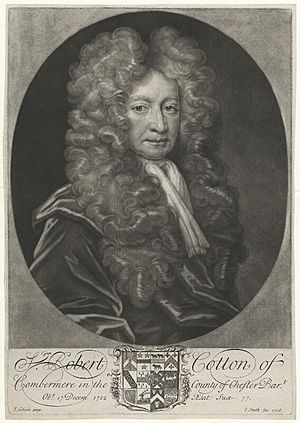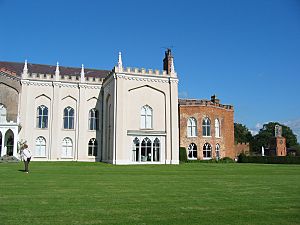Sir Robert Cotton, 1st Baronet, of Combermere facts for kids
Sir Robert Cotton, 1st Baronet (born around 1635 – died 18 December 1712), was an important English politician. He was part of the Whig political group. He served as a Member of Parliament (MP) for Cheshire from 1679 to 1681 and again from 1689 to 1702.
Contents
Sir Robert Cotton's Life and Politics
Early Life and Family Roots
Sir Robert was the oldest son of Thomas Cotton. His family lived at Combermere Abbey in Cheshire. His family had owned Combermere for a long time. King Henry VIII gave it to one of his ancestors around 1541. In 1677, Sir Robert received the special title of Baronet of Combermere.
Political Challenges and Beliefs
Sir Robert Cotton was a strong Whig. This meant he often disagreed with King James II. At one point, he faced serious political accusations. He was even held in the Tower of London. However, he was later found innocent of these charges.
He was happy about the Glorious Revolution. This was a big change in England's government. After this, he continued to be a respected politician. People saw him as a man who stuck to his principles. He was known for being honest and fair.
Family and Legacy
In 1684, Sir Robert married Hester Salusbury. She was the only child of a soldier and politician named Sir Thomas Salusbury. Through this marriage, the Cotton family gained more land. Their home at Combermere Abbey grew to include the Llewenni Estate in Wales.
Sir Robert and Hester had several children. Some of their known children include:
- Hugh-Calveley Cotton: He passed away before his father. He had a daughter named Catherine.
- Sir Thomas Cotton, 2nd Baronet, of Combermere: He inherited his father's title.
- Mary Cotton: She married Sir William Fowler.
- Anne Cotton: She married Sir Thomas Taylor, 1st Baronet. She later became the grandmother of the 1st Earl of Bective.
- Arabella Cotton: She married Henry Tichborne, 1st Baron Ferrard.
 | Calvin Brent |
 | Walter T. Bailey |
 | Martha Cassell Thompson |
 | Alberta Jeannette Cassell |



